Former Crispus Attucks guard will be inducted into the Indiana Basketball Hall of Fame
Writer / Dan Wakefield
Photographer / Brian Brosmer
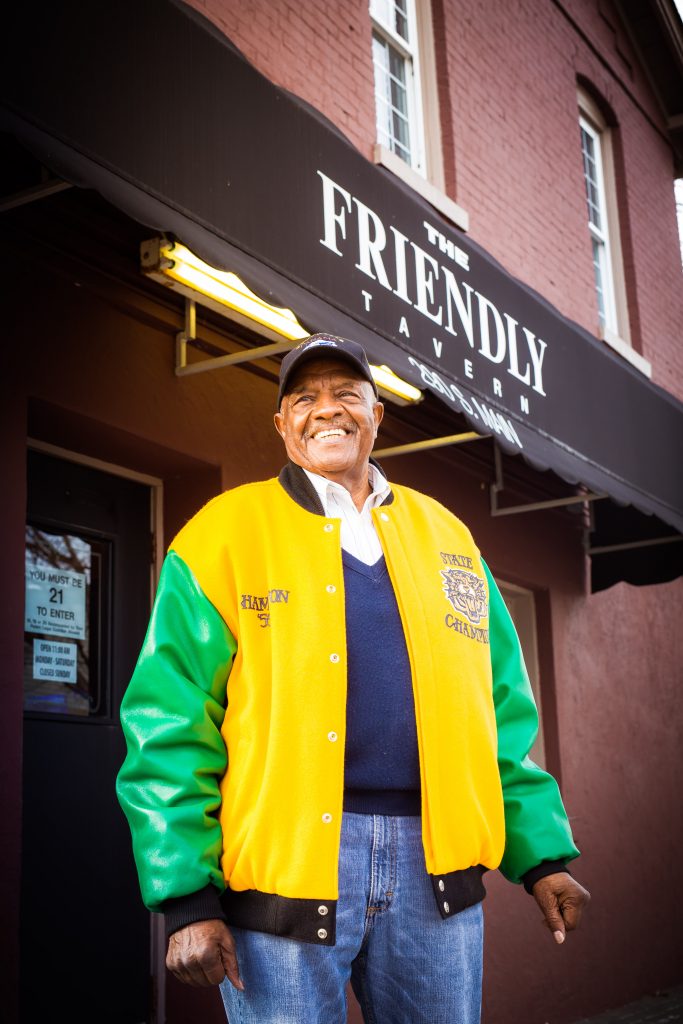 Here are two women who grew up in Indianapolis talking about their father: Tanya: “He’s a lot of fun. We danced, and we still dance! When I come back to Indy we put on Marvin Gaye and Al Green and we dance. Here, he was an athlete and he had two girls who are very girly – not the athletic type. He has a good, kind heart. We were spoiled.”
Here are two women who grew up in Indianapolis talking about their father: Tanya: “He’s a lot of fun. We danced, and we still dance! When I come back to Indy we put on Marvin Gaye and Al Green and we dance. Here, he was an athlete and he had two girls who are very girly – not the athletic type. He has a good, kind heart. We were spoiled.”
Tina: “Our dad just adored us. He was very thoughtful, and he expected a lot. We took ballet, but he showed us how to drive a nail and use a saw. He’d be out there in the backyard turning cartwheels with us. He wanted us to be strong. When we didn’t make good grades or do our chores we had privileges taken away. We couldn’t just go anywhere we wanted to go, we had a lot of guidance.”
Their dad, Bill Hampton, will be been inducted into the Indiana Basketball Hall of Fame.
Hampton, a thoughtful man who stands six feet, is mostly bald but has a black mustache and is still in good shape for his current sports of golf and bowling. He could probably still play some up-and-down the court basketball at the Fall Creek Y.
Hampton started at guard on the Crispus Attucks team that became the first black high school to win a state championship in 1955, not only in Indiana but in the entire United States. Attucks was also the first Indianapolis high school to win the state tournament, giving the city “Something to Cheer About,” as Indy native Betsy Blankenbaker called her documentary film of the legendary team. Ted Green, who made the new documentary film, “The School That Changed a City,” about the team as well as the outstanding faculty and graduates of Crispus Attucks, including Army generals as well as doctors, lawyers, Judges and scientists, nominated Hampton for the Hall of Fame.
“Of course, the superstar was Oscar Robertson,” Green said. “What you see in the films but never read about is it was the defense that started it all with the team, and Bill Hampton and Bill Scott started that from the guard position, making steals and streaking down the court in a blur, flying in a distinctly new era for the state’s beloved pastime.”
“The championship meant a great deal because it was nothing that you would ever envision would happen,” Hampton said. “It also meant a great deal because it meant so much to the people in the neighborhood that followed you, that followed Crispus Attucks. We didn’t have a lot to hang our hats on back then, unless it was Joe Louis fighting, Jackie Robinson playing or later Muhammad Ali boxing.”
Hampton and I are talking at Moe and Johnny’s, a north side restaurant and coffeehouse where, he points out, we would not have been able to sit together over coffee in the era when his team won the state championship. This was still a de facto segregated city in the mid-1950s. It was not until after Attucks won the state championship that Hampton and his teammates were allowed to eat at a downtown restaurant.
“It was Fendricks, on Illinois Street,” Hampton recalled. “And then we also got to go to our first downtown movie theater – The Lyric. But we had to sit in the balcony. After that we were just more comfortable going to the restaurants in our own neighborhood, like Doyle’s, ‘Shugs’ and Barbecue Heaven, and we went to the movies on Indiana Avenue like The Madame Walker, the Lido and The Indiana Theatre.”
Betty Crowe, the wife of Attucks’ coach Ray Crowe, said that black kids weren’t allowed to sit at lunch counters downtown in those days but had to stand at the end of the counter and wait for their order to be handed to them to take away.
“We didn’t have the money to go to lunch counters, we made our sandwiches at home,” Hampton said of himself and his teammates.
After they won the championship, restaurants on Indiana Avenue fed the Attucks players free, prompting one of the starters, Willie Meriwether, to tell his teammates: “We’ve got to keep winning so we can keep eating!”
Patience, restraint and dignity were just as important to that team’s success as their ability to put the ball in the basket. Crispus Attucks High School was founded by the Klan in 1927 and no black high schools, Catholic schools or The School for the Deaf had been allowed to play other teams in the Indiana High School Athletic Association until 1941 (and not allowed to play in the state tournament until a year later). So, Attucks teams had to travel to other states to get to games. When they finally had permission to play other Indiana teams, no Indianapolis schools were interested at first in scheduling them. They had to play teams from small schools in little farm towns with names like Prairie Creek and Rising Sun, taking sandwiches in brown bags since local restaurants wouldn’t serve them.
“In some of those little farm towns we played in people had never seen a black man before,” Hampton recalled.
Oscar Robertson, who became “Mr. Basketball” in Indiana, an All-American at Cincinnati University, an All-Pro on The Cincinnati Royals and Milwaukee Bucks, an icon of the sport who became the first basketball player ever to appear on the cover of Time Magazine, remembered in his autobiography The Big O, “We’d arrive in some of those little matchbox towns and folks would be waiting for our buses like we were from outer space, they’d follow us into the gym. Really. It’s comical in retrospect, the long gawking stares they’d give us.”
More important than athletic accomplishment, Green said, was that the Attucks players “overcame so many obstacles, displayed such sportsmanship and did what years of legal challenges couldn’t do – they brought together a divided city.”
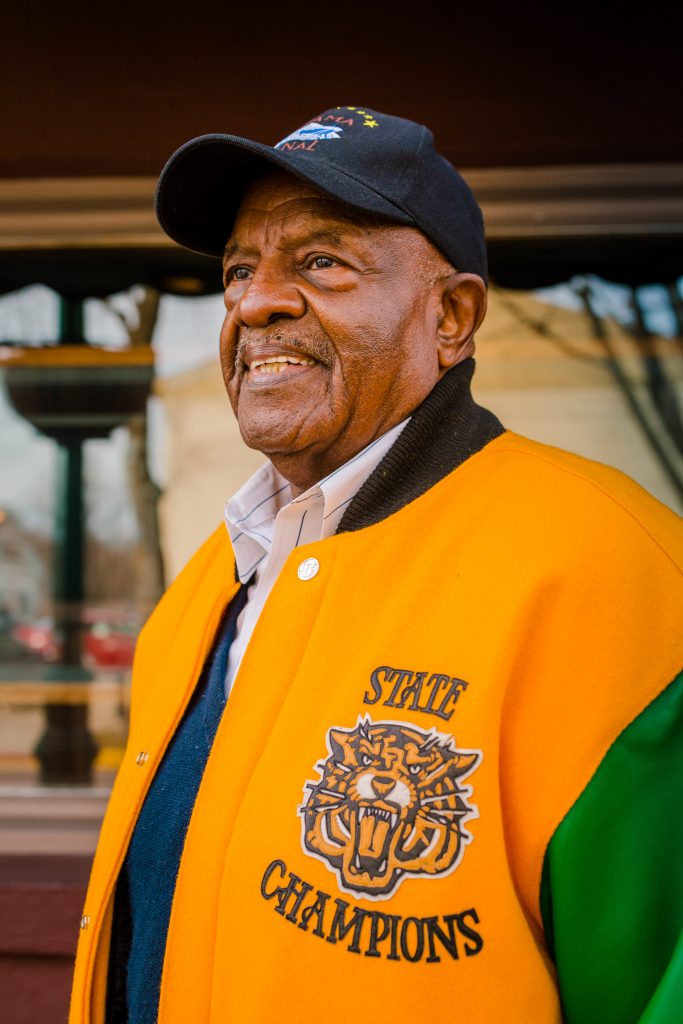 That’s where the patience, restraint and dignity came in. That’s what it took to never argue with a referee, never respond to racial slurs yelled from the stands, never get into a fight in the course of compiling a 51-5 record with Hampton in the starting lineup over two seasons, never complain that in most of the towns and cities where they traveled Hampton and his teammates were not allowed to eat in local restaurants. They weren’t even allowed to eat in their home city until after they won the championship, not even at Butler Fieldhouse where they brought in as many as 14,000 customers to see them play. Butler Fieldhouse, as well as the opposing teams, profited, and Butler profited further from the fans who ate at the cafeteria where the Attucks players who drew the crowds were not allowed to eat.
That’s where the patience, restraint and dignity came in. That’s what it took to never argue with a referee, never respond to racial slurs yelled from the stands, never get into a fight in the course of compiling a 51-5 record with Hampton in the starting lineup over two seasons, never complain that in most of the towns and cities where they traveled Hampton and his teammates were not allowed to eat in local restaurants. They weren’t even allowed to eat in their home city until after they won the championship, not even at Butler Fieldhouse where they brought in as many as 14,000 customers to see them play. Butler Fieldhouse, as well as the opposing teams, profited, and Butler profited further from the fans who ate at the cafeteria where the Attucks players who drew the crowds were not allowed to eat.
After high school, Bill’s coach, Ray Crowe, got him a scholarship at Indiana Central, where he had played.
“I had room and board and did work like keeping the gym floor clean,” Hampton said.
Hampton was twice an all-conference player, averaging 18.1 points a game in 1956-57 for the NAIA Regional Champions. He left after two years to go to work to help support his family.
“I know he went through hard times,” Tanya said. “I’ve always been very proud of him. I’m not starstruck by the great Attucks basketball players, because they were always around – Oscar and Willie Meriwether were like uncles, and they’re all still here now. It’s a blessing to see them all living.”
“We grew up with his team,” Tina said. “Now I understand what they did was much more than basketball, it was race relations. Now you appreciate what they did. History is not always pretty.”
A player cannot get into the Basketball Hall of Fame – at least not the Indiana Hall – for exploits on the court alone. They must also lead an exemplary life. Hampton scores high in that regard as well.
He worked for The Marion County Sheriff’s Office, a job he got at the suggestion of Bob Collins, the great Star sports writer and editor who was the first of his colleagues to recognize the Attucks’ unusual prowess. At the same time, a former sports editor was grumbling that Dr. James A. Naismith did not invent the game of basketball “for players with jumping jack legs.” Collins’ raves for the team drew curses on himself, letters to the editor calling him a communist and demanding he be fired, ugly late-night phone calls trash-talking his daughters, speeding past his house honking horns and yelling. None of it fazed Collins. Oscar Robertson said later that, “People really resented him for writing about us. I can’t even tell you in a few words how much he meant to our team at that time.”
Collins became friends with Coach Crowe, and he did not forget about the players after their basketball days were over.
“Bob Collins called me up one day and he asked me: ‘How would you like to be in the Sheriff’s department? We need more black guys there,’” Hampton said. “I was only the fourth black man to be hired there. It was Collins’ idea to have more. If we had more Bob Collins this would be a totally different place. We could ill afford to lose him.
“I think I started there in ’59 or ’60, but I only stayed three or four years because it was so racist,” Hampton said. “I didn’t feel I had to take that. You couldn’t go beyond your immediate supervisor with any complaint or suggestion. They put me on the 2nd shift – days gone and nights gone. I worked inside the jail. It was an atmosphere, the men above you telling you things like, ‘Who do you think you are?’ Most places were prejudiced, that’s the way it was. If you didn’t have thick skin, you wouldn’t survive.
“I left that job and sold life insurance,” he added. “I wanted to be in charge of me. I got to be a district manager. Then I had a Shell Oil station at 38th and College. Later on, I formed the Hampton Janitorial Service.”
Hampton served as Bailiff in the Washington Township Small Claims Court presided over by Judge Steve G. Poore.
“I worked with Bill Hampton a long time before I realized he was part of basketball history, he is such a humble guy,” Poore said. “I was in the Attucks gym when I played for Brebuf in ’72. We were pitiful, but it was a thrill to be in that gym. From watching Betsy Blankenbaker’s film about the team, I was not just impressed with the basketball, I was impressed with the grace and dignity these guys carried themselves with. It was inspiring.”
“I still work one day a week as a Deputy Constable in the court system,” Hampton said. “I quit full-time eight and a half years ago, and I said I’d only continue part-time another year or two but my daughter Tanya told me, ‘No, you can’t leave yet.’ My daughters tell me I’m still young, and I have to keep working. I tell them we need to sit down and do my will, and they say, ‘No, it’s not time for that yet.’
“It’s for them,” he added. “I wanted the Hall of Fame for my daughters.”
Tanya Nolcox from Phoenix and Tina Hampton from Ft. Lauderdale will both be there for their father’s induction into the Hall of Fame. As well as going to the ceremony and the dinner, there’s one more thing Bill’s daughters will likely do with their father while they’re here — they will dance.


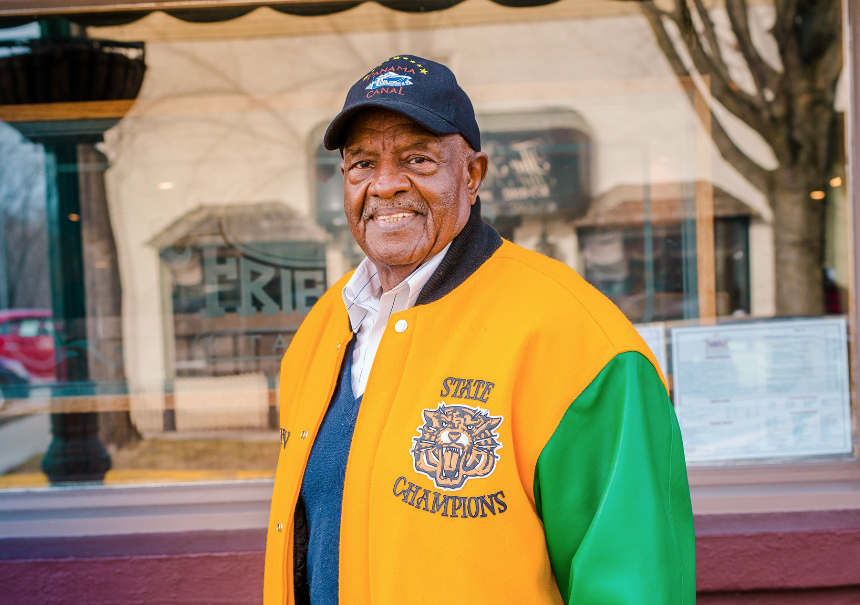

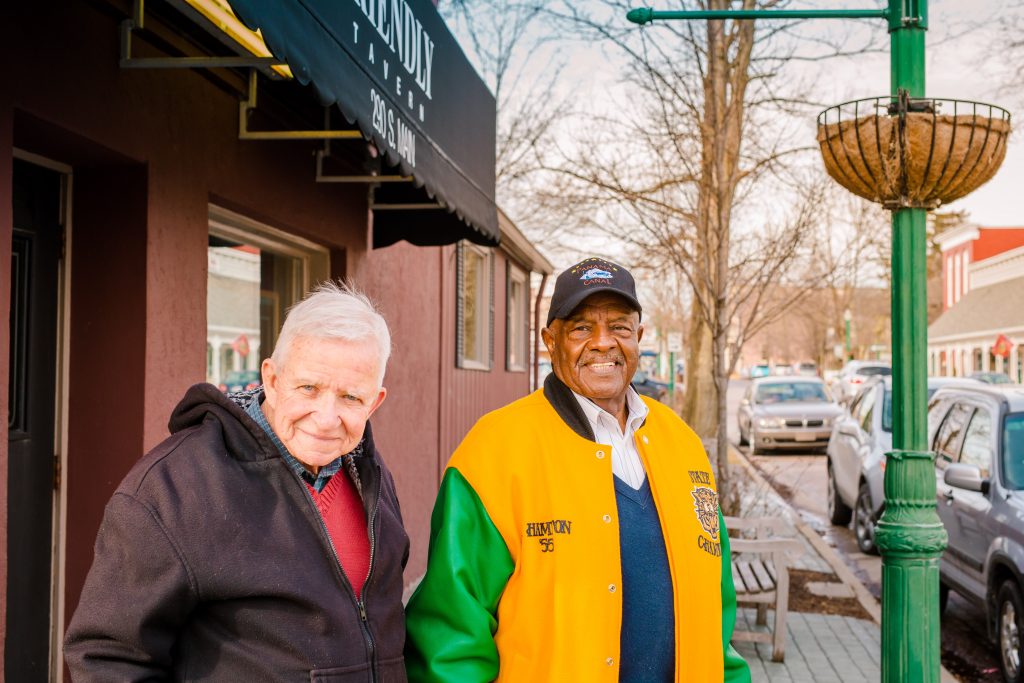
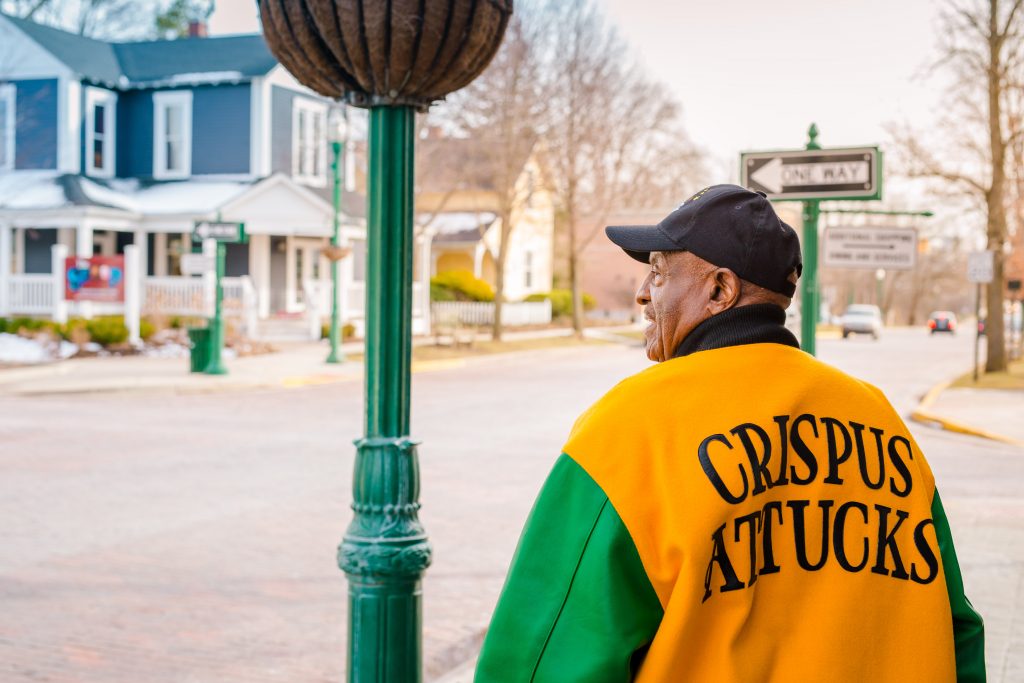



Comments 1